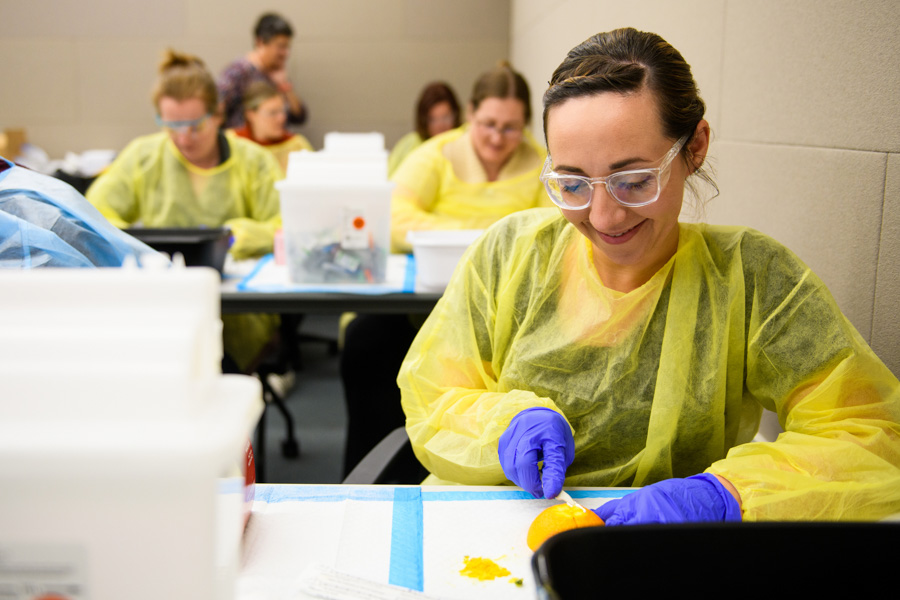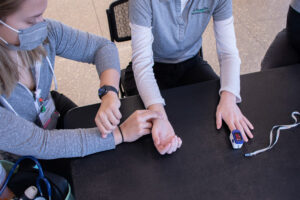
Public Health: Epidemiology
Bachelor's
PROGRAM SNAPSHOT
Understand how diseases spread. Alert populations about disease outbreaks. Recommend healthy behaviors.
When disease outbreaks happen, people need to have the right information to protect themselves and their health. That’s where epidemiologists come in.
Examples of epidemiologists at work are all around us. Think of E. coli reports on grocery store produce, salmonella alerts linked to restaurant chains, and the emerging trends around COVID. Especially in crises, the work of epidemiologists helps save lives.
The Public Health: Epidemiology major is for students who want a career that lets them be a problem solver, a scientist, and a researcher.
This program at Winona State will provide a foundation for you to track down what a disease is, where it started, and where it’s going next.
You’ll also hone your skills in the field with more than 600 hours of practicum and internship experience. You’ll even be ready to pursue health-based research and epidemiology graduate programs.
This major is available through WSU’s Department of Health, Exercise & Rehabilitation Science.
As a Public Health: Epidemiology major, you’ll dig into microbiology and biochemistry to understand how diseases work and how different diseases affect communities.
You’ll also:
- practice writing grants to secure funding for health program initiatives.
- understand how physical, social, and economic factors all affect our health.
- use statistics to identify outbreaks and find the best ways to prevent and control the spread of disease.
Your coursework will prepare you for careers in health agencies and research organizations.
Many students double major in Public Health: Epidemiology and Pre-Medicine or Pre-Dentistry to set themselves up for medical careers.
After growing up in Kenya, Gilbert Obiero ‘19 wanted to learn how he can help prevent disease and improve sanitation in his home country and beyond.
With his Public Health: Epidemiology degree, Gilbert now helps low-income individuals get the help they need.
Learn more about Gilbert’s Warrior JourneyAside from major- or minor-specific requirements, you’ll need to complete additional requirements through the General Education Program (GEP) to earn your degree from Winona State University.
Learn More about the GEP
In the Classroom
Throughout this program, you’ll brainstorm, practice, plan, and evaluate public health-related programs.
You’ll also create projects and presentations that address current and emerging issues in public health and epidemiology.
You could find yourself studying Seasonal Affective Disorder of WSU students and diseases ranging from the Zika virus and Lyme disease to syphilis and HIV.
During an upper-division program planning course, you’ll partner with community organizations to plan health promotion campaigns.
Recent campaigns that students have done include How to Safely Work Out, Food Waste, Sun Safety.
And during an upper-division grant writing class, you’ll learn how to write grants for funding to support community health education programs.
Employers across the country recognize the Certified Health Education Specialist (CHES) credential when hiring job candidates.
As a Public Health: Epidemiology major, you’ll take classes that prepare you to take the CHES exam through the National Commission for Health Education Credentialing, Inc.
Your core classes will explore the Areas of Responsibilities, offer a solid foundation for CHES exam preparation.
Be one step closer to becoming an epidemiologist by getting the real-world preparation you need along with your degree.
Winona State offers students access to First Aid and CPR certification through the American Red Cross.
You can also earn Mental Health First Aid certification through the National Alliance on Mental Illness (NAMI) to recognize early signs or symptoms that someone with a mental health challenge may have and refer them to the right support services.
You can earn your bachelor’s degree in Public Health: Epidemiology from WSU and your Master of Public Health (MPH) from St. Ambrose University in only 5 years with the 3+2 path.
During your final undergraduate year, you’ll earn credits that count toward both degrees.
This saves you time and money and makes you a competitive job candidate.
Beyond Campus
As a Public Health: Epidemiology major, you’ll complete a 600-hour hands-on internship before you graduate.
Students in this program have interned in data science, epidemiology, and research for Mayo Clinic, Bridges Health Clinic, local county health departments, and more.
This field experience will give you supervised practice with a variety of populations and health needs.
In addition to your internship, you’ll complete more than 60 practical hours in the community.
Your practicum allows you to gain experience developing several health education programs based on a population’s needs.
Students in this program have completed their practicums in research as well as data entry, evaluation, and assessment.
Apply what you learn in the classroom by traveling the world. At WSU, you can earn credit that counts toward your degree while exploring the globe.
Learn about health promotion in Peru, food systems in Hawaii, and health, exercise, and medicine in England and Ireland.
Or dive into the business of health care in Paris and child welfare and health systems in Jamaica.
Complement your studies and meet other students who are passionate about epidemiology and community health through campus clubs and organizations.
Join the Public Health Club, LeadHERS for Winona State HERS Alumni, or Medical Laboratory Science Club.
Check out the Biology Club, Chemistry Club, Pre-Dental Club, or Pre-Medical Club.
You can also become a student health and wellness advocate.
Stand out on your job applications even further with impressive volunteer experiences.
You can bridge the gap in access to health care through Bridges Health, a student-led and faculty-supported clinic that provides free services to community members.
Learn More
According to the Bureau of Labor Statistics, the field for epidemiologists is expected to grow 26% by 2031.
Within the next decade, mathematician and statistician positions also anticipate a 31% growth.

Bachelor's, Transfer Pathway

Bachelor's, Transfer Pathway

Bachelor's
